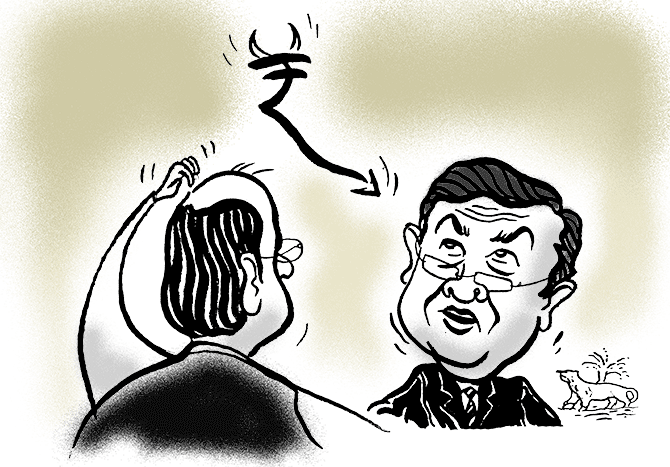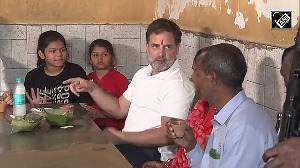If indeed the issues involved between the government and RBI are of immense public interest, why not make public the arguments of both the government and the RBI, irrespective of the outcome of the process, says Tamal Bandyopadhyay.
Illustration: Dominic Xavier/Rediff.com

In the Indian central bank’s 83-year history, two governors resigned before their terms ended -- Sir Osborne Smith (in 1937) and Sir Benegal Rama Rau (1957).
While Smith couldn’t stomach the government’s wont to dominate the central bank, Rau resigned due to differences with then finance minister T T Krishnamachari.
At least two other governors -- K R Puri and R N Malhotra -- had their tenures cut short following changes in the government.
Did Reserve Bank of India Governor Urjit Patel offer to resign recently?
We will know if he chooses to write a book later like some of his predecessors.
Will he or any of the deputy governors -- particularly Viral Acharya who has been vocal about the government’s lack of respect for the central bank’s independence, and N Vishwanathan, in charge of banking and non-banking regulations -- quit in future? That’s in the realm of speculation.
The RBI’s “fight” for autonomy and the government’s periodic iteration of “respect” for it are as old as the central bank itself.
What makes the current round unique is the use of Section 7 of the RBI Act by the government to “direct” the RBI on certain things which the central bank does not find fit to be done.
The government has never taken this route to assert itself, empowered by this particular provision.
Section 7 gives power to the government to “give such directions to the Bank as it may, after consultation with the governor of the Bank, consider necessary in the public interest”.
Combining two sections of the Bank of England Act, 1946, and Commonwealth Bank of Australia Act, 1945, this clause was inserted in 1949 into the RBI Act when the central bank was nationalised.
Then governor C D Deshmukh wanted the government to take the responsibility for its action if ever it decides to act against the advice of the governor but the idea did not find favour with then finance minister John Mathai.
So Section 4 of the Bank of England Act, which says, “The Treasury may from time to time give such directions to the Bank as, after consultation with the Governor of the Bank, they think necessary in the public interest”, was lifted and fitted into the RBI Act.
Should it be abolished? Many feel so but that’s a different story.
Incidentally, the government also has the power to appoint/reappoint the governor and deputy governors and remove them as well as any other director or member of a local board.
If the RBI fails to carry out its obligations under the Act, the government can even supersede its central board.
To be sure, the government’s right to “direct” is not confined to the RBI alone. This is true about other regulators as well.
For instance, Section 16 of the Securities and Exchange Board of India Act, 1992, empowers the government to issue directions on “questions of policy as the central government may give in writing to it from time to time”.
The Insurance Regulatory and Development Authority Act, the Life Insurance Corporation Act, the State Bank of India Act and the Competition Act all have this provision.
Even the regulators outside the financial system -- the Telecom Regulatory Authority of India, the Petroleum and Natural Gas Regulatory Board, International Airports Authority and the Central Electricity Regulatory Commission -- are subjected to face this.
But what is unique about the RBI Act is that the government needs to “consult” the governor before directing it and the action must be in “public interest" as opposed to the matters of “policy” in case of other regulators.
Consultation ensures that the government gets the benefit of the governor’s views on matters of public interest but the Act is silent on what happens if the governor’s views differ from that of the government. It also does not define what is public interest.
In the past few weeks, the government has sent three "directives" for consultation with the governor under Section 7 of the RBI Act.
It wants relaxation of the prompt corrective action (PCA) norms that restrains a bank’s activities, including lending.
Currently, 11 banks are under PCA and the government wants these banks to be able to lend to credit-starved medium and small enterprises.
It also wants the RBI to soften its February 12 directive to the banks that abolished all loan recast platforms and forced the banks to take all defaulters, including the power units, to the insolvency court.
It also wants the regulator to ensure liquidity for the non-banking finance companies, reeling under asset-liability mismatches. (I have not seen the notes but heard from people in Delhi and Mumbai.)
All eyes are now on the November 19 meeting of the RBI board which will take up the residual issues that could not be discussed at the October 23 meeting, despite it being the longest in recent history.
My guess is that the issues raised by the government need to be sorted out not at the board meeting but between the governor and the government.
Patel has probably sent back his views to the government, ending the consultation process.
If he does not want to budge from his stance, what can the government do? It can see merit in the governor’s arguments and decide against going ahead with its plan, or overrule Patel.
If indeed the government does so, will it be a blow to the RBI’s autonomy? A no-confidence in Patel, and hence, should he/his team resign?
Since it is enshrined in the Act, it cannot be interpreted as an attack on the RBI’s independence.
But the point to note is this provision has never been used in the past 69 years -- this bears testimony to the fact that it is meant to be used for the rarest of rare cases.
Do the current issues fall in this category?
Once used, there is always a risk of repeat of such actions by the government in future.
If indeed the issues involved are of immense public interest, why not make public the arguments of both the government and the RBI, irrespective of the outcome of the process?
Former RBI governor I G Patel once said: “Don’t nitpick. Pick your battles. Once you have picked your battles, fight those battles valiantly.”
Junior Patel is probably following Senior Patel’s advice. Let the public know who stands where -- both the government and the governor.
Resignation is no solution to the impasse.
Tamal Bandyopadhyay, a consulting editor with Business Standard, is an author.












 © 2025
© 2025